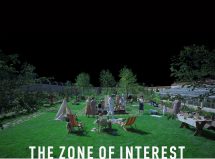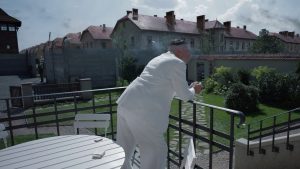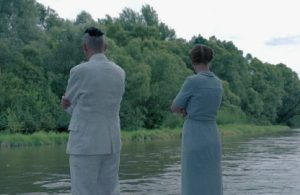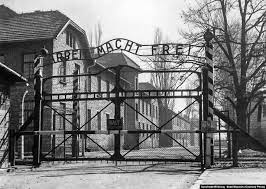The Zone of Interest

(Directed by Jonathan Glazer, based on the book by Martin Amis) (2023)
Poland is one beautiful country; with a plethora of mountains, verdant meadows, sea-coast, and more lakes than most. Which explains why so many imperialists wanted their grubby hands on it. In 1939, for example, as a result of the Molotov–Ribbentrop Pact, Poland was neatly sliced into two zones. One zone, the Russian one, executed an unknown number of Poles, sometimes with organisation, at other times in a haphazard panic. The German zone, where Poles (and others) were dealt with under typical Teutonic efficiency, is the ‘Zone of Interest’ in this film. That’s where Auschwitz was built, a complex of over 40 concentration and extermination camps which, over the period 1940 to early 1945, killed well over two million people.
Cue Jonathan Glazer (Under the Skin) and his take on Martin Amis’ 2014 novel, that channels Hannah Arendt, Schindler’s List, and all the rest. Many folks will think a film riffing on the well-worn trope of ‘banality of evil’ to be silly, or, worse, boring. For this reviewer, it is neither: rather, a riveting, edge-of-the-seat, domestic thriller, with amazing sounds, surreal touches (a phosphorescent Polish girl secretes apples behind the slave-worker shovels at night) and a dash of Wannsee Conference pathology. But it fails nevertheless, as all Shoah films must, for reasons we will attempt to explain.
The film’s intent is clear, and on its own terms, works well enough. Rudolf and Hedwig Höss (Christian Friedel and Sandra Hüller) and their five winsome children are living the dream in an idyllic country manor, with attentive servants, food on fine china, abundance and a lovely large walled garden, including a massive greenhouse. The film opens on a picnic by the river, a walk through the woods, home in two splendid motor cars, and then packing the children off to sleep. But, hang on…peeping above that garden wall next morning is what looks like a death camp – and here’s Rudolf in uniform, riding though the camp gate – to carry out his basically administrative tasks (logistics of rubbish disposal cycles, energy supply, fertilizing the greenery, the selection of work force (including the Joy Division), chastising staff for picking the flowers in an unruly manner, having supply-trains met, etc.)
At Casa Höss, hand-me-down clothes, a fine fur coat and jewellry, and teeth, are wheeled in from next door. ‘Cars’ keep ‘backfiring’ in the distance, preceded by yelling and barking. Rudolf and eldest son go horse-riding, commenting on the fauna while men in striped pyjamas are marched through the sward. Some agreeable fishing and swimming is disrupted by unidentified river impurities. Hedwig’s mother (Imogen Kogge), from modest circumstances (she lost her bid for a deportee’s curtains) marvels at how well things are with her daughter, until she sees what goes on at night over the bad-neighbour fence (about the only peep we get, until the film’s end).
After Mother leaves her breakfast, and a note the next morning, Hedwig lashes out at one of her Polish servants, observing tartly that she could have her husband scatter her ashes. The juxtaposition, of interior scenes of quiet and occasionally noisy domestic life, with the heavy-hints of genocide next door, will pall with many while it will resonate with many.
After some bureaucratic shuffling, Rudolf is to return home to assume charge of the final solution as it goes into even higher gear. From a palace reception in Hungary, imminent target for deportations, he ambles among the guests in a distant manner, oddly reminiscent of the finale to The Leopard, has a desultory conversation with his wife, and then prepares to leave to assume his important new role, attacked by nausea as he descends the dark stairs. And that is about it. Interspersed throughout are some blank, coloured screens, dread musical tweaks that combine yawps, groans and burps from hell, and enough static, often silent, set pieces to fill an Ingmar Bergman festival.
It is difficult to know what to make of this. Certainly the film is watchable; certainly it is not for all tastes. The acting and production are first class. But what does it achieve, exactly, since it poses as much more than art or entertainment? The discretion in not showing us directly how the Final Solution is playing out, yet the continual coy hints at it, begin to look like a hollow cabaret-turn. The madness of crowds is a phenomenon that continues to baffle the best minds and give succour to the worst souls. As we see, the view of fellow humans as filth, or rodents, goes on and on, and is probably endogenous, such that peace for all time becomes unimaginable. But how do you film that?
We can do no better than quote Clive James, in a slightly different context, here: “As with Stalin’s Great Terror, only a madman could guess what was on the way. Even the perpetrators had to go one step at a time, completing each step before they realised that the next one was possible. The German Jews were the most assimilated in Europe. They were vital to Germany’s culture – which, indeed, has never recovered from their extinction…The whole Nazi reality was a caricature. The more precisely you evoke it, the less probable it looks…There is no hope that the boundless horror of Nazi Germany can be transmitted entire to the generations that will succeed us. There is a limit to what we can absorb of other people’s experience. There is also a limit to how guilty we should feel about being unable to remember…Santayana…said that those who forget the past are condemned to relive it. Those who remember are condemned to relive it too. Besides, freedoms are not guaranteed by historians and philosophers, but by a broad consent among common people about what constitutes decent behaviour. Decency means nothing if it is not vulgarised. Nor can the truth be passed on without being simplified. The most we can hope for is that it shall not be travestied.“*
[*”The Observer”, 10/9/1978, reviewing Holocaust.]Leave a comment...
While your email address is required to post a comment, it will NOT be published.





0 Comments